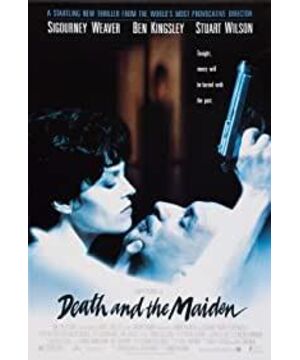A film about hurt, guilt and revenge.
A few impressive points.
One is how to get justice. The heroine was raped and sexually abused many years ago. This traumatic memory made her very nervous and vigilant. When she accidentally recognized that the neighbor was actually the perpetrator, she carried out methods such as beating, tying, and intimidation, in an attempt to restore the scene and reverse the situation. character, carry out a missing trial and execution. A woman cannot avenge a man by rape, but she can castrate. The question is, what is the essential difference between the so-called abuser and the abused party if the principle of using violence to control violence is pursued?
Yet judicial incompetence. After the military dictatorships of various Latin American countries defected, the immunity laws promulgated by their respective countries allowed political prisoners who had trampled on human rights and killed lives to go unpunished. What can ordinary people do as victims? The most ironic thing in the film is that the heroine's husband is a lawyer (a symbol of the judicial system), and he has just been appointed as the chairman of the national committee for dealing with the legacy of the dictatorship (a manifestation of the so-called official attitude of investigation), but he has been silent, even I can't handle my wife's affairs. The heroine didn't kill the neighbor in the end, she just wanted justice. Justice is not the result of violence against violence.
The second is the motif of "Death and the Maiden". In Western culture, the personified god of death often appears as a teenage seducer. Because the heroine's life in the film is completely destroyed by sexual abuse (death can be seen as an extension), this motif is used very well. (Unfortunately, it is not easy to understand in the Chinese context, so the translation is "immoral judgment")
The stroke of genius is the use of Schubert's quartet "Death and the Maiden". Neighbors played this tune to cheer it up when they were violent (so don't marvel at what a German nation, edified by poetry and music, did in Nazi concentration camps, the ugliness of human nature runs deep). At the beginning and end, both the heroine and her husband are listening to the quartet in the concert hall. The difference is the attitude of the heroine, which changed from the initial fear and anger to the final calm and calm. We cannot deny the utility of uncovering the truth and punishing the perpetrator for the recovery of the victim's trauma. So if silence is chosen at the national level, the wounds of the people will never heal. Fortunately, Latin American countries have made breakthroughs in this regard in the past decade.
The third is memory trigger media. The heroine was blindfolded, and she recognized the perpetrator by her voice and smell. I have always felt that among memory-triggering media, words and language have the weakest effect, images are the next, and sounds, smells, and touch are the strongest (people are far from tapping into their sensory potential). In this sense, the role of the Schubert piece belongs to the master's pen.
The film is adapted from a drama, with only three characters, and the plot almost all takes place in a seaside villa. The discussion of pain, guilt and revenge is directly exciting, but the viewing experience is a bit too scary and depressing.
Finally, I want to say that at the beginning of the film, the story takes place in a country in South America that has just ended its military dictatorship, and it does not specify which country it is (for example, I am only familiar with the history of Chile), because the story is placed in any one It applies to South American countries, or, in other words, to any country that has just ended its military dictatorship.
We only studied Chinese history and Western European history, and it would be a great loss not to study South American history (make up for it if you have time?).
View more about Death and the Maiden reviews











